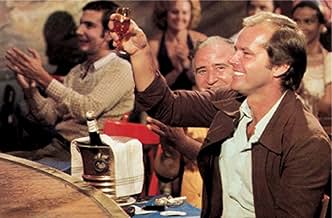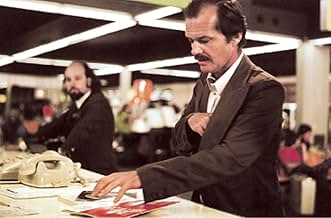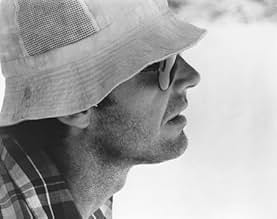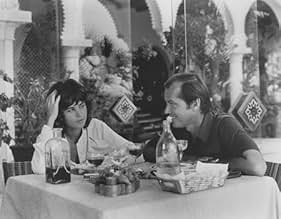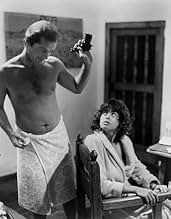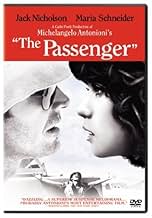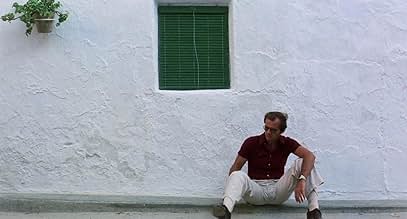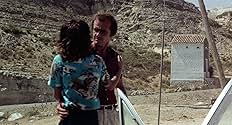Un giornalista frustrato in cerca di libertà assume l'identità di un uomo morto, che si rivela essere un trafficante d'armi.Un giornalista frustrato in cerca di libertà assume l'identità di un uomo morto, che si rivela essere un trafficante d'armi.Un giornalista frustrato in cerca di libertà assume l'identità di un uomo morto, che si rivela essere un trafficante d'armi.
- Regia
- Sceneggiatura
- Star
- Premi
- 5 vittorie e 2 candidature totali
- Robertson
- (as Chuck Mulvehill)
- Hotel Clerk
- (non citato nei titoli originali)
- Murderer's accomplice
- (non citato nei titoli originali)
- Cameraman
- (non citato nei titoli originali)
Recensioni in evidenza
"Professione: reporter", to me, belongs to the most interesting period of Antonioni's career (between the second half of the Sixties and the first of the Seventies). Because in these years the Italian director made his most accessible works: "Blow Up" (1966), "Zabryskie point" (1969) and "Professione: reporter" ("The Passenger", 1974). These films contain more action and more situations. They are neither more commercial nor more mainstream, but they talk about an adventure or a dream.
A journalist in North Africa switches the identity with a dead man who looks like him. He does this to escape from his life and for living a more interesting one. But he'll pay for his choice...
It's difficult to say, but this Antonioni movie (with his recurrent themes and -in a smaller way- times) has a lot of suspense, if I can say so. Once you begin to watch it, you can't give up. The funny thing is that nothing really big or special happens: sometimes it seems a road movie, sometimes it is a typical Antonioni analysis of the society. Jack Nicholson -how young he was at that time!- fills the film, his performance and his expressions are brilliant. It's also interesting the chemistry with Maria Schneider, the lady of "The last tango in Paris" -an actress who never got the fame and the recognition she deserved.
Cinematography is fantastic. But, above all, the big surprise of the film is the final shot: a 7-8 minutes take without cuts, absolute amazing. It's not describable, it's a must!
From the very first sequence, this is a starkly shot film with a very unique visual signature to everything you see. A desolate, exotic locale for a movie: the North African desert. But this desert setting is perfectly in accord with the refreshing cinematic technique of Michelangelo Antonioni, who always stressed economy. Just as in his other works, there are no unnecessary ornaments or frills here. He introduces us to the strange, existential story in this film, and its odd, solitary, lead character-- in as clean, pure, and undiluted terms as possible. The principle here is that 'less is more'.
Some people really dislike this about Antonioni. He uses his camera in such a quiet way; and there is just this single, very terse figure/ground relationship which is the focus of his attention. But I think he knows that character stands out with more relief when its set against a minimalist background. Here, because characterization is channeled through Jack Nicholson, (far better even than in 'Blow-up' with David Hemmings) its more than enough. The brevity and scarcity in the film funnels you straight into Nicholson's awesome talent. We are along with him for the ride.
The plot starts out cryptically and simply, with very little explained about the man the camera spends so much time on. Jack Nicholson is a reporter named David Locke, and he is covering an African civil war. But beyond this, you must infer most everything else about him from just what you see-just by observing his behavior, and nothing else. There is scant dialogue of any kind. The depth of Nicholson's character is conveyed in miniscule components, parsed out after long intervals. His overall demeanor is weary, frustrated, sullen; the typical traveler who cant get good service. But he is also dispirited with his mission and in a way, despondent about his whole future and way of life.
Then suddenly, he sheds his persona and takes on someone elses'. He is staying in an isolated hotel and a man in the next room dies accidentally-and Nicholson decides to trade identities with the corpse; leaving the hotel with this new identity and letting everyone think it is he who has died. It's the personal reasons for this act, which Antonioni explores throughout the rest of the movie: the consequences and responsibilities incurred when you gamble upon coincidence and invest in random chance.
(II)
'Passenger' follows the progress of a man through a personal crisis; an identity transformation. The film is split with a Doppler-shift down the meridian of the identity theft Nicholson commits. His problems after this act consist of trying to make sure his ex-wife and employers continue to assume he is dead; and deciding how much of the false man's life and business to play at.
With the plot as its laid out this way, we might not ever really ever know the full reasons why Locke exchanged personality for that of another. But Antonioni adds some really clever flourishes: since Locke was a news journalist, the video interviews he conducted up to the point of his 'death' are available both to the people who begin to hunt him, and to us. We actually see more of Locke revealed in these flashbacks than we do in real-time. It adds just the right note. We get a better idea of the reasoning behind this bold act, why he casually gave up his whole history on a whim.
In his assignments up to this side trip to North Africa, we discern that Locke is dissatisfied with 'the rules' governing his profession. He is a talented observer, and wants to be a good reporter. But he finds all the news he gathers is in a way, pre-constrained by cultural filters. Its not raw enough, instead, its already been processed for him. In other words, he is never getting the real story; as long as he is a reporter, people frame their information for him as a reporter. As long as he is an Anglo, people treat him as an Anglo.
But after the identity-shedding transformation, he is free; and he has the time of his life. Returning to London, Locke amusedly begins playing the role of the dead man: keeping his engagements, carrying out business deals. Theres no accountability; he is pretending to be someone else. Only one thing: the dead man was an arms dealer and Nicholson is getting into deep trouble by masquerading this way. His philosophical pleasure may be cut short sooner than he expects. He doesnt see the trouble coming his way, but we do. Its a sort of combination of film noir and road-trip movie here; and it works.
(III)
Things begin to unravel. Shady customers start to dog his footsteps. Growing increasingly edgy, as he continues to follow the strange itinerary, Nicholson hooks up by coincidence with a young architecture student backpacking through Spain (well-played by petite, dusky, sensual Maria Schneider). They're an odd pair; but their joining forces makes one of a most intriguing screen romances of the period. She isn't given much to do in the screenplay, but makes a wonderful calming presence to the brittle Nicholson. Her character insists that Locke should, in all rationality, continue his journey--she is rigorous about principles. Locke acquiesces and he continues on, down along the coast of Spain towards Africa again, on his fool's errands, to meet his fate.
I wont expose any more of the plot. But I will say the final sequence of this movie is extremely startling and powerful. I had never even heard about it; in my opinion it should be talked about much, much more. Totally daring and innovative. Antonioni really shows what he can do here-you simply have to see it.
There are some flaws, yes: a few of Antonioni's flashbacks come off lame and awkward- too abrupt. They're really irksome. And there is a sloppy element in the final denoument, which I still cant understand: the drivers school vehicle. I yearn for the movie to be re-cut to remove these failings. But its still very satisfying as is.
(IV)
The bottom line here is that Nicholson has, in this film, a showcase for his talents like few other projects I have seen him in. This film was made in 1975, just a year after 'Chinatown' and the same year as his cameo in The Who's `Tommy' and his lead role in Milos Foreman's `One Flew Over the Cuckoo's Nest'. Jack is quite young, fit, and good-looking when he made this film. Its rewarding to remember him as he was then, before he both let himself go somewhat physically, and also began playing so many 'sick, horny focker' roles. This is one of the highlights of his entire life's work, imho. Easily as memorable as Jake Gittes or MacMurphy.
Jack is careful to do a good job in this movie--perhaps at this point in his career, he was still worried about major goof-ups. Its definitely prior to the point where he began to 'coast'. It looks like he took this film seriously--and probably enjoyed it immensely. Anyway, what other actor do you know today that could walk away with a difficult role like this one; an actor who would be as supremely interesting to us (as Nicholson is, in many scenes in this film) doing not much of anything for long moments at a time?
I doubt even DeNiro could have succeeded--he would have played it too 'tough-guy' and added too much gesture. Its Nicholson's laconic, dry twang, his sardonic gestures and those bored, squinty, seen-it-all eyes, that makes it work. There is a world-weariness about him in this performance that is quite special. The weight of past experiences exudes strongly from him; and its just what Antonioni needed. This quality defined him for this role like no other contemporary actor of his time.
Anyway, in this flick, you know he is doomed but you aren't really sure how Antonioni is going to do it. Antonioni creates massive tension with that very economical, severe camera style and almost no music. There are many scenes where the only sounds are the background noises from the environment itself; you can practically see Nicholson's sweat, hear his breath, and feel his pulse. Nicholson, surely very aware of this tight focus on him, maintains a rigid grip on his character throughout the film.
He isn't at all cocky--his special trait is his vulnerability. Nicholson always seems tough on the outside, but also as if he can still be hurt (as we see here, and in Chinatown as well). Its a vulnerability very like Bogart's in 'Casablanca'. In fact, if this film had been made in a previous generation, (as Gene Siskel once claimed) there would have been no there actor besides Bogart who could have even pulled it off. But no matter what: its great to see Nicholson on his own, competing with no other strong castmembers, just cruising along as a lone, insecure American among hostile and unfriendly foreigners.
His characterization is superbly restrained and un-showy; his gestures and expressions are as bland as possible; and there are no wildly quotable lines or speeches (any Nicholson fan should view this film for this reason alone). Anyway, by the end of the flick, you are positioned so closely alongside Nicholson--so wrapped up in his fate--that the brilliant, low-key finale can take you by surprise and it leaves a terrific poignancy.
In short, there are many reasons to like this film. I heartily recommend it. Its easily the best movie I have seen in some time. Its essential for appreciating both Nicholson and Antonioni. I encourage you to rent this movie on VHS as I am sure you will relish it as well.
"I'd like to enquire about flights," Locke asks a hotel clerk. He seeks to escape his past. Later in the film, as he rides a cable cart, Locke spreads his arms and soars like a bird. He's flying, finally enjoying a brief moment of freedom.
The theme of identity, and Locke's name itself, immediately recalls the writings of English philosopher John Locke. Locke believed in the concept of the "tabula rasa" or blank slate. He believed that it was our experiences that defined us as people and that the only way to escape who we are is to effectively erase our history and cut ourselves off from experiences.
Throughout his writings, Locke emphasised the individual's freedom to author his or her own soul. Each individual was free to define his character, but his basic identity as a member of the human species could not be altered. So Locke had two ideas at war. Firstly the belief that the individual was free to author his own life, and secondly the belief that human nature is rigid and unchangeable. It is from this presumption of a free, self authored mind, combined with a sense of rigid human nature, that the Lockean doctrine of "natural" rights is derived.
In Antonioni's film, Nicholson articulates these ideas himself. He is trapped between wanting to be free and having to fulfil duties/roles/tasks embedded in the new persona he has acquired. While responding to a comment that all PLACES are the same, he even argues that it's actually the PEOPLE that are the same. That everyone conforms to specific cultural archetypes. The film's original title, "Profession: Reporter", highlights this point best.
Nicholson's character is desperate to escape this. Like his character in "Five Easy Pieces", he wants some unmappable freedom. He wants to be an individual. Beyond this, though, he wants to stay blank. In what is perhaps the film's most joyous moment, a female character asks Locke what he's running from. He tells her to turn her back to the front of the car. What occurs next is an instant of spontaneous elation and giddy happiness, as she watches the road rush away behind them.
But what people fail to notice during this scene, is that she is in fact watching the past. By facing her previous experiences (which Locke refuses to do) she is happy. Happiness comes from her memories and past encounters, while Locke is miserable simply because he refuses to acknowledge his past experiences.
Throughout the film Locke is asked whether he thinks "the landscape" is beautiful. Once he answers "no", another time he absent mindedly answers "yes", but Antonioni stresses that Locke is really not paying attention. Locke intentionally avoids absorbing beauty or new experiences in an effort to remain in a constant state of rebirth.
These themes are culminated in a brilliant "blind man" story towards the end of the film. Locke, a journalist who specialises in seeing and recording the truth, is painfully attuned to what he calls the "dirt" of the world. As such, he chooses to remain blind. A blank slate.
Antonioni is particularly good at endings and the final shot of "The Passenger" really elevates the whole film. Like the dead man, whose identity he took on, Locke dies alone and face down in a bed. His ex wife pops up and states that she never knew him, but nobody seems to care.
9/10- A great film, worth two viewings. It captures a profound sense of isolation and sadness. Antonioni's camera seems to capture the immense tiredness of the body. Rather than portray experiences, he shows what remains of past experiences. He shows what comes afterwards, when everything has been said. The middle portion of the film is slow and seems to be lacking some sort of superficial drama, but things build nicely and the final payoff well is worth the wait.
Directed by Michelangelo Antonioni and written alongside Mark Peploe and Peter Wollen, 'The Passenger' is an intriguing, atmospheric drama exploring the complexities of truth, identity and isolation. It is a subtle, low-key film that doesn't rely on garrulous dialogue to forward the narrative, and is open to interpretation in many ways. Antonioni strikes a perfect balance between visual and oral storytelling, using Locke's journey to contemplate the impermanence of identity, the mysteries of truth and the devastation of alienation. Though Locke escapes from his unfulfilling life, he cannot run from his past. Nor can he escape the past associated with his new identity, or the fate attached to it.
Here, one could say that Antonioni is suggesting that identity is not something one can easily define or control, but rather something that one has to constantly negotiate and question. He uses Locke's story to posit that identity is not necessarily a source of meaning or fulfilment, but rather one of confusion and alienation. Furthermore, the alienation Locke feels is not just with his environment and with those around him, but with himself. He struggles throughout the film with his sense of purpose, and only by embracing his alienation does he find a potential source of new perspectives and experiences. In this way, Antonioni shows how alienation can positively affect one's life.
Additionally, the notions of truth and reality being stable and fixed concepts are put to question, as every character in the film is involved in a lie, in one way or another. The world of 'The Passenger' is one riddled with contradictions and uncertainties, in terms of perception and beliefs. The film shows us that truth is elusive, and not necessarily a source of clarity or certainty, but rather one of befuddlement and melancholy. As is the case with the themes of identity and alienation, Antonioni's exploration of truth and reality is one that feels consistently fresh and intriguing throughout 'The Passenger'; making its narrative one that you'd be hard pressed to forget.
Despite this depth and complexity of narrative, it is the cinematography that is the real draw here, which is epic and atmospheric. Luciano Tovoli's utilisation of long takes and natural lighting creates a realistic and immersive style contrasted with the alienating world Locke finds himself in. His artful framing and composition carries symbolic, expressive meanings- such as the use of windows and mirrors to create frames within frames, suggesting Locke's entrapment and isolation.
Tovoli also makes excellent use of zooms, pans, tilts and tracking shots to create dynamic and fluid transitions between spaces and perspectives, mirroring Locke's search for truth and identity. His handling of a seven-minute tracking shot at the end of the movie is particularly breath-taking; perhaps one of the finest such sequences ever put to film. This intense scene acts as a metaphor for Locke's journey, as well as creating a contrast between the realistic and symbolic, challenging our perception and understanding of reality, as it shows us things that are not possible or logical.
Through its use of long takes, deep focus and natural lighting- creating a modernist, minimalist aesthetic that reflects the characters' alienation- the film is reminiscent of Antonioni's previous 'L'Avventura' trilogy; though in colour and on location. Conversely, some may compare the visual aesthetics to those of Yasujiro Ozu or Robert Bresson, who used natural lighting to generate a realistic and contemplative style that explored the human condition in a profound, assured way. Whatever the case, the cinematography of 'The Passenger' is arguably its greatest strength, enhancing the film's themes and narrative by creating a contrast between the realistic and the symbolic; while always remaining visually stunning.
'The Passenger' stars Jack Nicholson as Locke, delivering a measured performance that rivals his similarly understated efforts in 'The King of Marvin Gardens' and 'Five Easy Pieces.' From his opening moments- trapped in the desert unable to communicate with anyone- to his last, Nicholson mesmerizes. Consistently underplaying it, he never sets a foot wrong performance-wise, sharing an easy chemistry with co-star Maria Schneider that makes watching them together a real treat. For her part, Schneider brings a light touch to proceedings and- though her role is a little underwritten- shines throughout; leaving an indelible impression on the viewer.
Having said all that, if you don't appreciate abstract, existentialist films, or narratives that are open to interpretation and draped in mystery and intrigue; 'The Passenger' may not be for you. It is a complex film that doesn't clearly or definitely state its intentions or explain its meanings. Beautifully shot and strongly acted, 'The Passenger' examines some profound themes in a mature, understated way, and is a highlight of Antonioni's oeuvre. If you do appreciate the abstract, the mysterious and the profound, then hop on board 'The Passenger': it's one hell of a ride.
Despite its power and polemic against journalism, Professione: Reporter is also an understated movie from start to finish, made for a grown-up audience. Nothing is spelt out for you. However, the movie is strewn throughout with powerful and evocative visual clues, so it's nonetheless up to you as an attentive viewer to pick up (the early scene of Locke's Jeep getting stuck in the African desert sand, anyone?), or even soak them up unconsciously. As with all Antonioni, every shot in this movie is worthy of analysis and admiration. Bergman once said about the Italian that he could create some arresting individual images, but was incapable of stringing them all together in the sequence of a palatable movie: sorry Ingmar, old man - as much as I feel in awe of your craft, you're talking nonsense, here. However, I can't believe Antonioni once had the cheek to say he improvises each scene as he goes along (see his IMDb quotes page). There isn't a chance in hell these meticulously crafted, immaculately framed and composed movies are not also carefully premeditated. Clearly, Antonioni was trying to start a myth about himself along the lines of the one about Mozart composing his music straight onto the page, as dictated by God. In Professione: Reporter, I was especially in awe of the sequence involving the single long take from the window of Locke's last hotel room in an unnamed, dusty Spanish village. Regarding Maria Schneider, it truly is a shame she wasn't the star in a greater number of successful movies. Her ambiguity makes it very difficult to keep one's eyes off her when she's on screen. She looks like a cross between a boy, a girl and something cutely ape-like (I mean it in a good way!).
I would like to warn viewers of the inclusion of footage of a real execution - again, this was a film within the film. Personally, I found it very disturbing, which is why I'm mentioning it here.
Lo sapevi?
- QuizWhen Michelangelo Antonioni received his honorary Oscar in 1995, the Academy asked Jack Nicholson to present it to him.
- BlooperThere are a couple of inaccuracies in the displayed details of Locke's Air Afrique air ticket that was evidently issued in Douala, Cameroon in August 1974. The name of Fort-Lamy (Chad's neighboring capital city) became N'djamena in early 1973, and Paris is written in Italian ("Parigi") which would not have occurred in French-speaking Douala.
- Citazioni
The Girl: Isn't it funny how things happen? All the shapes we make. Wouldn't it be terrible to be blind?
David Locke: I know a man who was blind. When he was nearly 40 years old, he had an operation and regained his sight.
The Girl: How was it like?
David Locke: At first he was elated... really high. Faces... colors... landscapes. But then everything began to change. The world was much poorer than he imagined. No one had ever told him how much dirt there was. How much ugliness. He noticed ugliness everywhere. When he was blind... he used to cross the street alone with a stick. After he regained his sight... he became afraid. He began to live in darkness. He never left his room. After three years he killed himself.
- Curiosità sui creditiLeo, the MGM lion, which normally precedes the opening credits of MGM movies, has been supplanted by "BEGINNING OUR NEXT 50 YEARS". Leo then returns in the center with "GOLDEN ANNIVERSARY" on either side of it.
- Versioni alternativeSeven minutes were added to the 2005-2006 re-release version, including a brief shot of a nude Maria Schneider in bed with Jack Nicholson in the Spanish hotel.
- ConnessioniFeatured in Z Channel: A Magnificent Obsession (2004)
I più visti
- How long is The Passenger?Powered by Alexa
Dettagli
- Data di uscita
- Paesi di origine
- Sito ufficiale
- Lingue
- Celebre anche come
- The Passenger
- Luoghi delle riprese
- Fort Polignac, Algeria(desert scenes, setting: Chad)
- Aziende produttrici
- Vedi altri crediti dell’azienda su IMDbPro
Botteghino
- Lordo Stati Uniti e Canada
- 620.155 USD
- Fine settimana di apertura Stati Uniti e Canada
- 24.157 USD
- 30 ott 2005
- Lordo in tutto il mondo
- 769.503 USD
Contribuisci a questa pagina




